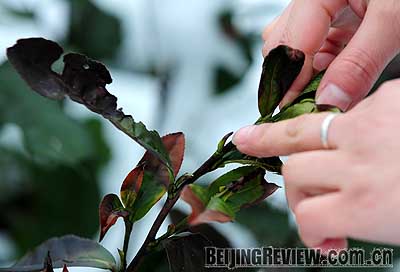| Food Safety Law
China's top legislature approved the Food Safety Law on February 28, providing a legal basis for the government to strengthen safeguards for the food supply "from the production line to the dining table."
 |
|
DEADLY SNOW Tea trees in Anhui Province's Huoshan County freeze to death from a sudden drop in temperature. Anhui snowstorms caused losses of 827 million yuan ($121.6 million) in the two weeks before March 3 (CHEN YEHUA ) | The law, which will go into effect on June 1, will enhance monitoring and supervision, tighten safety standards, recall substandard products and severely punish offenders.
Winning 158 of the 165 votes at the Standing Committee of the National People's Congress, the law said the State Council, or Cabinet, would set up a state-level safety commission to oversee the entire food-monitoring system, whose lack of efficiency has been blamed for repeated scandals.
Significant Emancipation
The emancipation of 1 million serfs in Tibet 50 years ago amounted to a level of progress as remarkable as the anti-slavery movement's success in the United States during that country's Civil War (1861-65), said a white paper published on March 2 by China's State Council Information Office.
The white paper said the government's decision to quell an armed rebellion by feudal serf owners on March 10, 1959, and to free the serfs was an act of great significance "not only in the history of China's human rights development, but also in the world's anti-slavery history."
"The historical significance of this righteous action is entirely comparable to the emancipation of the slaves in the American Civil War," claimed the white paper, titled Fifty Years of Democratic Reform in Tibet.
Premier Online
Chinese Premier Wen Jiabao chatted online for two hours with nearly 300,000 netizens and mobile-phone users during a forum broadcast over the Internet on February 28.
Bombarded by questions over the widening income gap and government corruption, Wen said that in a society where fairness and justice prevail, the public should be able to share the fruits of reform.
Society would become unstable if wealth is concentrated in the hands of a few people while the majority remain stuck in poverty, Wen said. "However, the needy would have no way to shake off poverty while the society was static, so only through development and progress can we tackle such difficulty from the root," he said. "To uphold democracy and have the people truly in charge, we must rely not upon individuals but upon a sound system to secure top-to-bottom communication for the government to listen to the voices of the masses."
Proposals Heard
More than 99 percent of the proposals from China's political advisors over the past year received responses from the appropriate departments or were otherwise handled in line with the country's laws and regulations, said Zhang Rongming, Vice Chairwoman of the 11th National Committee of the Chinese People's Political Consultative Conference (CPPCC), China's top advisory body, at the opening meeting of CPPCC's annual session on March 3.
Her report at the meeting spelled out how suggestions and proposals from CPPCC members were handled since the last session in 2008. CPPCC members had raised 5,056 proposals in the year ending February 20 on politics, the economy, science, ecological conservation and other issues, Zhang said. | 